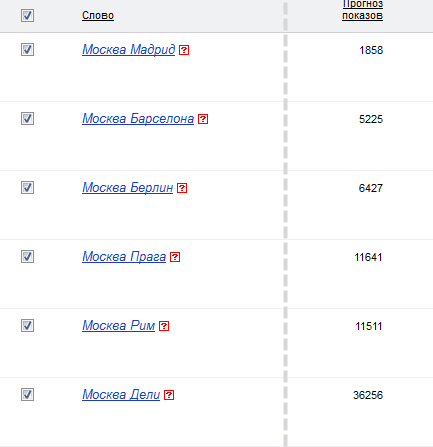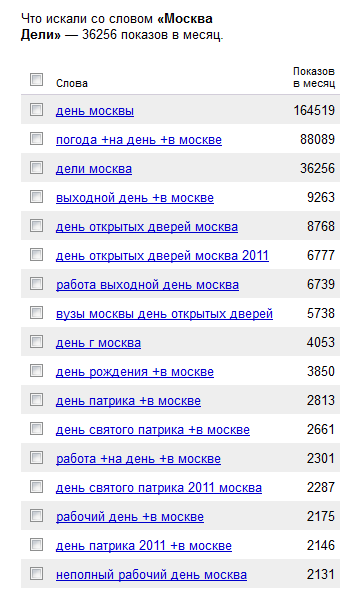Normalization of requests in Yandex.Direct or a little about the pitfalls in the selection of words

My colleagues often ask me to write more about the pitfalls and various secrets of Yandex.Direct. In this post I will talk about the number 1 underwater stone - normalization or gluing queries.
So, there is a client of the Republic of Kazakhstan in the subject of airline tickets. The theme is very wide, a huge amount of traffic. There is a task "to show anyone who is looking for any information about any direction available for air travel, the cost of transfer should be as low as possible - 30 kopecks." Ok, the task is clear, customizable ( here - more about how to configure one-cent RK).
')
The primary media plan showed a very unexpected picture. Here is a snapshot of a screenshot of the "Budget Assessment"

Statistics shows gives us information about the very unpopular tourist destination in the capital of India is requested 4-8 times more often than popular destinations in Europe. But this is some kind of nonsense! (with)
We look at the semantic core of the query "Moscow Delhi" and we are very surprised.

In the semantic core, we clearly see that the words “Delhi” (the capital of India) and “Day” (the time interval of the day) are considered by Yandex to be the same and merge them into one query. It also sticks together, for example, single and plural forms of words (“buy a ticket” and “buy tickets” - Direct considers it as one request until the advertiser forcibly fixes the word form with the help of the corresponding operator).
I inform Support on such a strange behavior of WordStat, I get the expected response. It works the normalization mechanism.
" , .
, "" "" - "", ."We forcefully fix the “Delhi” word form with the help of the operator (!) And get a completely adequate forecast - 776 hits per month for the target audience. That fully corresponds to the demand of the Internet audience for this direction.
Thus, due to the total complexity of the linguistic apparatus of the Russian language and the insufficient intelligence of Wordstat in understanding the nature of requests, we can get a similar picture in any subject:
For example when advertising
a) at the request of “Moscow - Kiev” the ad is shown including an absolutely untargeted audience - to those who want to “buy a billiard cue in Moscow”. The word "Kiev" for Yandex is only a plural form of the request "cue" (billiard room).
b) on request "repair floors". When buying such a request, an ad is shown to those who are looking for “Repair of Flying hours”.
c) on request “buy% product name%” an ad is shown to all those who are looking for “buy% product name%”, that is, not customers, but direct competitors. Their sales managers regularly scan forums and bulletin boards in search of buyers for% product name% precisely with the help of such a query
etc. Cases when, thanks to this kind of gluing together of requests, it is possible to get impressions of the untargeted audience are quite frequent.
From here two conclusions.
1) In all doubtful cases, we look at the semantic core of the query for sticking “our” query with “our own” queries.
2) In all doubtful cases, use the fixation operator of the word form (!)
Be attentive and successful sales!
Source: https://habr.com/ru/post/118580/
All Articles